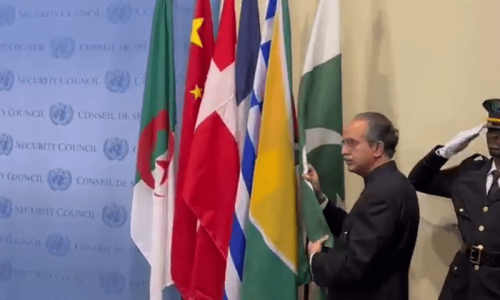This is a volume dedicated by its author to himself. What we have here, then, is a creative act of casting, and then confronting, one’s own image. This is fascinating — and it is fascinating largely because of the promise that, hidden perhaps in this chamber of two mutually entangled worlds, may well lie the key to the explication of Peerzada Salman’s Urdu poetry. The two worlds — one given to the poet without his consent, the other created by the poet himself, both floating in Waqt, the title of the book which means “time in its countable moments that form an unending series.”
A slim new volume of Urdu poetry stitches together a tapestry of poetic forms and speaks in a contemporary diction while grappling with the poet’s existential spectacles
So in the preamble to Waqt, we hear Salman acknowledging: “Numerous writers and poets have kept me afloat, but only one of them has impressed me — and that one is Peerzada Salman.” How interesting, Peerzada Salman impressing Peerzada Salman! Here the subject becomes the object, but then the object is none other than the subject itself. This is a sport of mutual reversals that is both daring and familiar. It is daring because the signature self-echoes of modernist Urdu poetry never quite declared its terrifying subjectivity in this explicit manner. Noon Meem Rashid, Majeed Amjad, Miraji — they all internalised the cosmos, but they never told us that they are doing so; they probably didn’t even know that they are doing so. But Salman at the very outset announces openly and expressly his engagement with his own self. And the sport is familiar because it is this self-orientation that is the hallmark of much recent verse.
But not only of recent verse, let’s recall that Rumi, too, told us that ‘the voice’ of the friend comes from none other than his inner being — his own being that floats in waqt, a being captured in the grey matter, the skin and bones and veins of which his physical body is made. This is all familiar. And then we have Mirza Asadullah Khan Ghalib, who tells his cruel beloved that the mirror she shattered held an image; and now he mourns the ruining of a whole world of desire:

Ghalib’s lamentation is over an image, not over the outer object that is reflected and remains intact when the mirror is broken into pieces. It’s the poet’s created world that matters, not the given world. In effect, this is what Salman seems to be telling us. “No, I don’t have an ideology; sufficient for me is my own existence.” And existence does not consist in the corporeal body, for “body is but a metaphor”, analogous to the image of Ghalib. Indeed, a time will come when, in actual fact, life would transcend physical elements, “a time when life would not be Fire, Water or Earth.” What ultimately abides then? Indeed, what abides is Salman’s own being — for when he is done with his daily labour and chores that earn him a living, now in solitude, away from his children, friends and city noises, what happens then? “When I am done with all of this, loneliness descends on me, and I begin to recall myself.” Then, when Salman charges the onlooker to behold his “dream manifesting itself”, he also utters a word of alert: “Look at this metaphor in your eyes!” So dream is a metaphor and body is a metaphor and sufficient for the poet is his own being.
But there is a challenge here. Between the outer cosmos and the inner being is interposed another world — the human society with its relations, attachments and demands. I see a tripartite juggling of these three worlds as one of the defining attributes of Salman’s poetry. He is often cynical about the social world, sometimes quite viciously, and the moon and stars, the heavens, fragrances and music charm him. This is then balanced by a return into his own self, from which all else arises and to which all else now converges. We see here a recoiling of imagination, rebounding back to where it begins, back to the ‘image’.
Turning now to the poetics of Waqt, we find stitched together in this slender volume a whole tapestry of poetic forms. Open verse, blank verse, short poems, long poems, seh satriyan [three liners] and, of course, that resilient genre, the ghazal with its stringent metrical and conventional demands, a region where we see a Peerzada Salman in an altogether different cloak. Then, given that this is a book of poetry, it is not crafted without poetic attributes — it comes with its rhythm and balance, and its symbolism and aesthetic control. While some items in the collection may seem formulaic and schematic, there is hardly anything prosaic and flat here. What is striking is that the book’s ecology shows some new growth and brings some new fragrances.
Yes, this is a work whose drift is contemporary, speaking to us directly in this world of ours with its mobile phones, its social media and its global experience. Making a lizard the subject of a poem; speaking of ID cards and passports, of spiders and computers; noticing a pretty girl holding a David Cronenberg film — this is all novel in the house of Urdu poetry and belongs to this real world of ours today. And Cronenberg? Isn’t he that living filmmaker who intertwines the psychological with the physical, who happens to be the pioneer of what is called the body horror genre? Why does Salman make that pretty girl of Waqt carry a Cronenberg film? This is a resounding question for our times.

There is also an irony here that in many ways embodies our human psychological condition of the day. The poet is exhausted even before he begins to present his work, another reversal of states. Thus, in the very first poem, ‘Nizamuddin’, we hear the poet’s breathless resignation: [Now listen Nizamuddin, I am just exhausted!/ I am exhausted!/ See, I’ve changed houses, I’ve gathered my provisions/ I’ve waited impatiently/ And now I am exhausted!]
The book begins with a withdrawal, withdrawal before appearance. On the other hand, Salman does engage with the interposed world of a regulated and uneven human society. There is a spectacle here — in this spectacle, there is this indigent child and a broken dream of images and colours, there is this activity of journalism and the question of freedoms and then there is the larger city itself. But hovering over all this is Salman himself with his idiosyncrasies and his rejections, sometimes with contempt for what is manufactured by the human being.
But what about Salman’s ghazals, a paradoxical genre with its stringent formal restrictions and its limitless substantive freedoms? Well, that calls for a separate treatment, for as I said already, in the realm of ghazal we see another poet. And yet, even when Waqt flows in its remarkable lyricism expressed in this traditional mode, the book retains throughout its freshness of diction, its anger and cynicism, and its self-convergence.

[This string of stars that you see/ This is the story of the desolate/ A vacuum lost in darkness/ A vacuum lost in silence/ The skies shedding tears/ And the search for light continues...]
The reviewer is Professor of Comparative Liberal Studies at Habib University and Visiting Scholar at the University of Pennsylvania
*All translations are by the reviewer
Waqt
By Peerzada Salman
100pp.
Published in Dawn, Books & Authors, January 27th, 2019
















































Dear visitor, the comments section is undergoing an overhaul and will return soon.